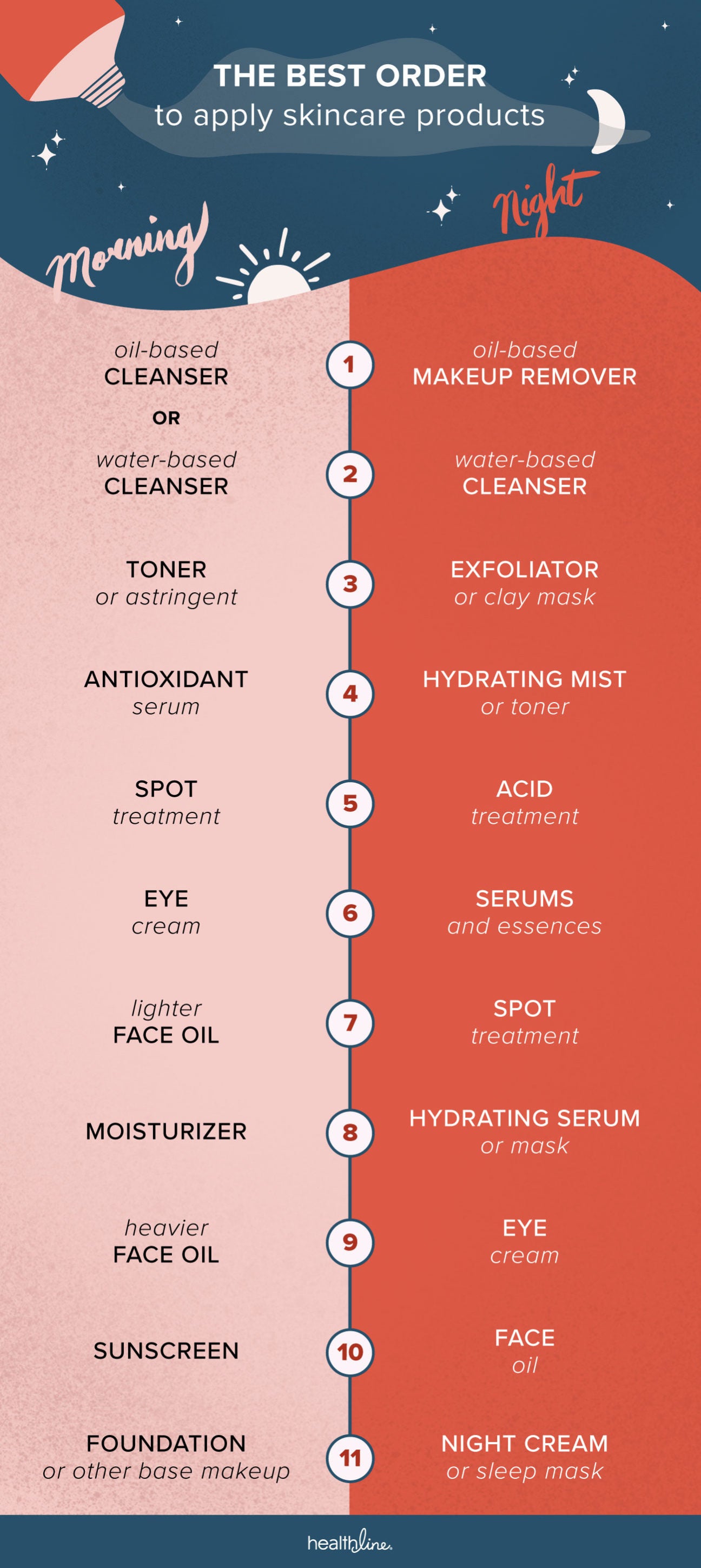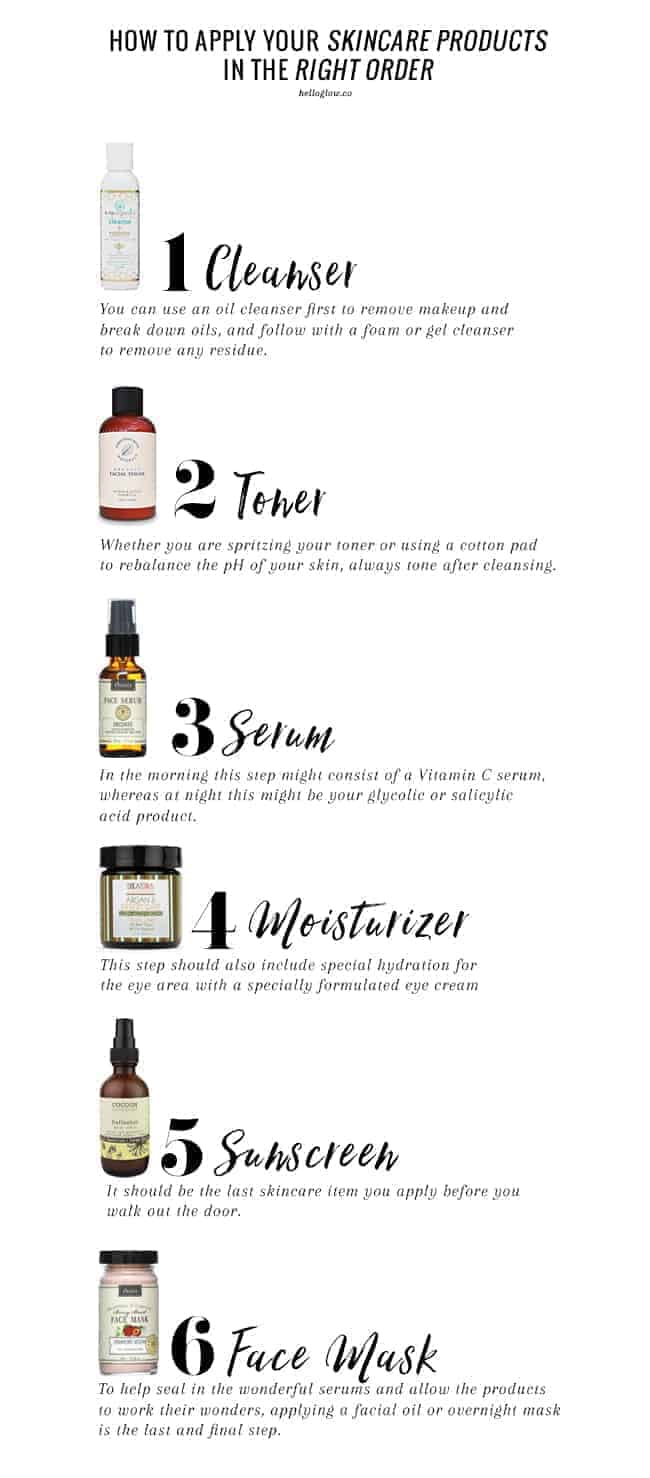Where moisturizers sit on the surface of the skin, facial oils go deeper to deliver moisture from the inside out. "Facial oils are valuable because they contain active ingredients and they are lipophilic (or fat-loving) so they effectively penetrate into the dermis to trap in hydration," Chang says. Though body oils and body lotions have the same end goal—to moisturize your skin—they get the job done in different ways. "When you layer an occlusive oil on top of a lotion you get better penetration of the active ingredients in the lotion producing faster and more noticeable hydrating benefits," she says. Over the past few years, facial oils have taken the skincare world by storm. Packed with nutrients like vitamin C, essential fatty acids and antioxidants, they penetrate the skin and transform it by building a resilient skin layer known as the lipid barrier.
So, if a facial oil isn't a part of your regular routine, then you're seriously missing out something great for your skin. Also, if you're new to it, you may be confused about when to use it. But, instead of confusing yourself, read here to learn the correct way. Our pick for the best water based moisturizer for face is Formulyst Super Hyaluronic Water Moisturizer. This lightweight formula features hyaluronic acid, the key molecule involved in skin hydration. Hyaluronic acid helps boost your skin's natural nourishing powers by attracting atmospheric moisture and transforming it into intense hydration for your skin.
Even though it is a water based moisturizer, Formulyst Super Hyaluronic Water Moisturizer contains jojoba oil and apricot kernel oil to balance oil production. Both of these botanical oils are non-comedogenic, so you don't have to worry about clogged pores or breakouts. An oil-based moisturizer is best for those with dry skin that has a damaged barrier or lacks sebum.
The oil-based ingredients will help to replenish the skin's barrier function. Many oils also contain vitamins and fatty acids that impart anti-aging benefits. For instance, rosehip seed oil contains provitamin A, mostly as beta carotene. Beta carotene has the ability to increase cell turnover and promote regeneration in the outer layers of the skin. Over time, this can help even out skin tone and add a "glow" to the skin. So this oil-based moisturizer not only helps to replenish the skin's lipid barrier but also provides a youthful glow to skin.
The type of product that you use is also heavily dependent on your skin type. For oily skin, Siso says you can use just a moisturizing lotion. Normal to dry skin types can layer both lotion and oil as long as they are not acne prone in the areas where they're layering products, Siso adds. If you're on the hunt for an oil to add into your routine, Levin recommends squalene, marula, or jojoba oil, since they can help with redness and won't clog pores, given the molecule size.
These natural oils will not only condition skin, but they're also packed with essential vitamins. Gohara mentions mineral oil-based products like Vaseline are also a great choice for most skin types. Oils to avoid in skincare are argan and coconut oil, since the molecule size is larger and therefore may contribute to acne .
Serums, slather on a moisturizer packed with ingredients like hyaluronic acid and ceramides, which your pores will drink right up. "Oils are really better at sealing in moisture due to their occlusive nature—they prevent the evaporation of hydration from skin to the environment," explains Dr. Nazarian. Thanks to the fact that oils are emollients, they'll create a barrier on your skin to lock in all that hydrating goodness from your moisturizer.
Contrary to popular belief, most oils and oil-based moisturizers will not clog your pores and cause breakouts. The theory with using oils on breakout-prone skin is that they actually help balance your skin's sebum production, and help your skin's own oil flow more freely . If you have oily or acne-prone skin, the most important thing to look for when choosing an oil-based moisturizer is "non-comedogenic", which means it will not clog pores.
Examples of non-comedogenic oil-based ingredients include jojoba oil, linoleic acid, argan oil, and grapeseed oil. There are so many new and exciting products in the beauty world that it's hard to keep up with all the developments. Whether it's an oil, serum, lotion, cleanser, or balm, it seems like there's a product that promises to fix any skincare concern. Body lotions and body oils have been around forever, promise to deliver moisture to your skin, and slow natural signs of aging. Lauren Siso, a licensed esthetician, and ALP owner of ELLEMES Medical Spa in Atlanta, Georgia, gave the details on what you need to know before choosing lotion or oil. These natural oils are also able to work to repair and protect the skin barrier and provide lasting nourishment whenever your skin is feeling dry.
So while moisturizers provide instant hydration, face oils provide long-lasting moisture with a vitamin-enriched bonus. So oils also work by helping the skin barrier seal everything in, ensuring none of your skin's water content gets lost. For example, where should oil go in your skin-care routine? Except that every day in beauty forums and on Instagram, people are debating it. The idea that your products should go on "thinnest to thickest" needs to go home, it's drunk. Or understand that their creamy moisturizer containing hyaluronic acid is in fact thinner, molecularly speaking, than their runny rosehip oil?
Repeat after me; oils will never be serums and oils should always be last. Making sweeping, generalized recommendations isn't wise in the world of skincare, because no one's skin is the same. You might have dry skin some days and oily the next, or your skin could respond to oils better than lotions and vice versa.
Most experts don't advise replacing your moisturizer with a facial oil, because as mentioned, they aren't really the same. In conclusion, facial oils are definitely better than commercial moisturizers. They have many benefits including getting rid of acne, preventing premature aging, and managing fine lines and wrinkles.
Not to mention that most of them on the market are all-natural and safe to use. However, you should take into consideration that some of them may cause irritation or other side effects. Before using any oil on your face, make sure that it is safe to use on your skin by doing some research first.
If you start using a face oil and start to get a rash or pimples it is best that you consult with a professional as there might be an underlying issue. Some people have issues with conventional moisturizers, they might make your skin feel even dryer, or oilier because they have ingredients that are quite questionable. If you are one of these people then maybe face oils are the perfect solution to your problem. However, I recently added a new face oil to my routine and the instructions explicitly advise applying the productbefore moisturizer. The reason being that in addition to natural oils, the product contains concentrated active ingredients and the product is designed to serve as a serum. Another reason one might want to apply face oil first is if it's the morning and you use a moisturizer with SPF since oil can dilute sunscreen and make it less effective.
Face oils are different from face serums, the latter of which are meant to treat specific skin concerns with various active ingredients. "An oil is made up of, well, only oil," Boone explains. "Oil sits on top of the skin and is best applied last in your skin care routine," she notes, whereas serums should be applied before moisturizers and after toner — but more on that later. What makes an oil an oil are the ingredients, not necessarily the label. "Inwater-based moisturizers, the first ingredient listed is often water," Dr. Lortscher says. "Some of this water will be absorbed by the skin, and some of the water will evaporate.
After washing your face, refresh your skin with an effective toner. Toners are highly concentrated formulas that help balance the oils in your skin and remove excess impurities that remain after cleansing. It is important to look for one that compliments your skin type.
For oily skin , try a pore minimizing toner that helps reduce shine and the appearance of enlarged pores. For normal-to-dry skin, try a gentle, alcohol-free facial toner that is formulated not to over-dry or strip skin of natural oils. Face oils may hold the secret to achieving healthy, radiant skin—no matter what your skin type (yes, even those of you with perpetually oily skin!). Jam-packed with nutrients like vitamin C, essential fatty acids and antioxidants,they penetrate the skin to transform and protect—helping to build a resilient skin layer known as the lipid barrier. Learn the correct way to apply them and how to choose the right oil for your skin type. "Oils can easily penetrate moisturizers, serums, and treatments, but no products can penetrate an oil, which means they need to be applied last," says Dr. Gohara.
And don't think that oils are just for dry skin—certain oils, like rose-hip and jojoba, can decrease excess oil in acne-prone skin, while marula and aloe oils can soothe sensitive, easily irritated skin. Opt for a serum filled with hyaluronic acid, which pulls water from the air into your skin to plump it up and keep it hydrated while you sleep. Basically, a hydrating serum is a 10/10 idea if you're also using retinol. The thicker, heavier ingredients in creams & lotions are designed to form a barrier on your skin. Address and correct your specific concerns by boosting your routine with a face serum.
These targeted products are designed to help improve myriad skin concerns by delivering highly concentrated formulations of active ingredients . Apply to cleansed, toned skin morning and night daily. Remember to apply your facial serum before your face oil and/or moisturizer . Though botanical oils can lock in moisture, they don't contain humectants, meaning they can't add hydration back to your skin. For dehydrated skin, look for a moisturizer with natural humectants like hyaluronic acid, silver tremella extract, and honey that will draw water into your skin.
Your moisturizer should also have natural emollients like botanical oils that lock in moisture. If you're using a face oil, use it after your moisturizer, since the hydrating ingredients in your moisturizer won't absorb properly after an oil. "I do find that a lot of people who only use oils are actually really dehydrated or their skin barrier is compromised underneath all that application of oils," adds Levin. We all all need to find that perfect balance between occlusives and humectants. If you like to pat an oil on your skin, do so after a lightweight lotion.
If you apply a humectant-heavy serum or lotion on top of an oil or oil-reach cream, all you'll accomplish is wasting product. As a rule of thumb, we typically recommend applying products in order from lightest to heaviest. For oils and serums, that usually means applying serums (which are often water-based) first.
After the serum absorbs into your skin, you can apply facial oil, and then moisturizer and sunscreen. A basic skin care routine has fewer steps than an expanded one but keeps your skin clean and healthy. The steps can depend on your needs and the amount of time you have. Usually, a basic routine includes removing makeup, cleansing your face, applying a spot treatment for any blemishes, using sunblock during the day, and putting on moisturizer.
For people with dry and combination skin types who want to use both an oil and moisturizer simultaneously, Rouleau says that many people actually apply them incorrectly. Most people know that skin care products should be applied from lightest to heaviest, but not many people actually know what "lightest to heaviest" means. One of today's most lauded skincare items —facial oils — is also one that many people are confused about how to use properly. Although treatment oils can be incredibly effective for most skin types, the way they are used also plays a role when it comes to results.
It's important to assess skin type and skin issues in order to select the right oil for optimum success. While oils do have some slight variation , in general, the main benefit — moisturising — is something they all have in common. Turns out, slathering oil on oily, acne-prone skin can actually be a good thing, says Dr. Wexler.
Oftentimes, people break out not because of they have naturally oily skin, but because their skin barrier is dry, damaged, and inflamed from a regimen of harsh acne products. That damaged skin barrier then overcompensates by producing even more oil, which can clog pores and trigger breakouts. At night, some people also like to layer various types ofskin care boosters, which you'll see as either mists, essences, beauty waters or hydrating serums. These are infused with different active ingredients, but for the most part, the purpose is mainly to hydrate and nourish skin.
Should I Use Oil Or Moisturizer You probably should know by now the importance of moisturizing the skin cannot be undermined regardless of skin type. However, before you apply skin moisturizer, it is important to consider the skin care products you're applying to your skin. But, have you ever considered whether or not you are applying the products in the right order? Do you wonder if face oil can be a substitute for moisturizer or maybe face oil should be applied before moisturizer?
You can only know this if you understand how the rule of skincare layering works, which will be discussed below. The short answer is yes, oils are part of the moisturizing process. First, one must understand the difference between an occlusive and a humectant, the two main types of skin moisturizers. An occlusive is a heavy cream or oil that seals moisture just like plastic wrap but for your skin. Because what good is moisture if it evaporates right off your face? A humectant is an ingredient that draws in water from the environment or the lotion itself, like glycerin or hyaluronic acid.
As you can see, facial oils should always be the last step of your skincare routine. If you use a facial oil before a water-based moisturiser, the moisturiser wouldn't penetrate your skin effectively. Facial oils are the skincare products for luxurious-feeling, smooth skin. Adding this extra step into your skincare routine is certain to make your skin bright and glowy and - the best bit is - face oils are easy to apply and don't require much effort - yes! Here are our 10 top tips for using facial oils in your skincare regime.
Cleanser, moisturizer, SPF, done.Maybetoner, if you were feeling fancy. Today, the fundamentals tend to get overshadowed by the fun stuff — essences, acids, ampoules, serums, oils, mists, masks, and more — meaning it'sprobablytime to revisit the basics. You don't want to overuse a treatment oil because it will create a layer over the top of the surface, which then creates more heat to be trapped within the skin. Heat will cause more oil production and allow for bacteria to grow more quickly, ultimately resulting in a potential for increased acne. To clarify a major skincare myth, oils are not moisturizers.
Oils are considered "occlusives," a fancy word that basically means they act like a barrier to keep moisture from evaporating out of your skin . So it's best to apply oils on either slightly damp skin—to trap all that water in your pores—or massage it on over your moisturizer to lock in all of the hydrating ingredients. Every face oil has a different formulation, weight, and absorption rate, making some better suited for certain skin types and concerns than others. Castor oil and grape-seed oil, for example, decrease excess oil on acne-prone skin, while coconut oil and avocado oil act as incredibly rich moisturizers for dry skin. A water based moisturizer is best for those with dehydrated skin that is in need of moisture. Ingredients such as glycerin and hyaluronic acid are often used in water based moisturizers, and they can deliver powerful hydration to dehydrated skin.























